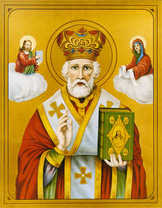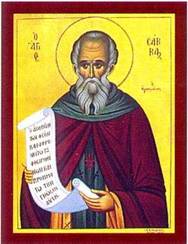 There are so many saints who have feast days during Advent that it is almost difficult to keep up with them all, but today I would like to highlight two of them. One is the saint whose feast day is today, St. Nicholas, (seen on the left), and the other is St. Sabas, who is little known by many, and yet has become one of my favorites because of his unusual story. In Advent we most often focus on Zechariah and Elizabeth, John the Baptist and preparing the way, Mary and Joseph, shepherds and kings, etc. While all these are wonderful “teachers,” important to meditate upon, I would like to offer a different pair, St. Nicholas of Myra and St. Sabas. I think these saints are appropriate because they have a lot of insights to offer us about the true meaning of this season of preparation. St. Nicholas, who our modern Santa Claus is modeled after, was actually bishop of Myra (in what is now Turkey) and died in 352 AD. He was known for his kindness and generosity, and now he is co-patron of Russia, along with St. Andrew. His story revolves around a situation which he remedied with anonymous (at the time) acts of charity. There was a man he knew of who had a number of daughters who could not marry because they lacked the funds for a dowry. In fact, the family was so poor that the daughters were about to engage in prostitution in order to pay the bills. In the dark of night, Bishop Nicholas went to their house and left a sack of gold coins in the father's room which he dropped in through an open window, (so much for the chimney!) so that they could afford what was needed and could avoid sin. Some stories say he did this more than once, possibly three times, and no one knew he was the giver, at least not right away. St. Nicholas was also known for performing a number of miracles during his lifetime. St. Nicholas teaches us about being generous, but also teaches us that acts of charity are even greater when we do them out of love and not for any thanks. It was not simply because of humility that he did not want it known that he was the giver, but also because he did not want to embarrass the man to whom he gave. When we give, especially large amounts such as those given by St. Nicholas, it is easy to set up a bit of a hierarchy. The receiver might feel he owes something, or that he is "beholden" to the one who gives. The recipient might feel embarrassed that he or she is in the position of neediness. Therefore what St. Nicholas did was helpful, but let the family retain their dignity. He also kept them from sinning in their desperation. He knew these were good people who would not otherwise have wanted to sin in such a humiliating way. (Note: I recommend reading the book or seeing the film Les Miserables to experience this lesson on an epic scale. A simple act of generosity by a bishop, directed to a man who was driven to steal, changed the man’s life. I have heard that Victor Hugo had the acts of St. Nicholas in mind when he fashioned the bishop in his book.)  The feast of St. Sabas is on December 5th. Like St. Nicholas, he was also from what is now Turkey. St. Sabas was born in approximately 439 and died in 532, therefore these two men were contemporaries, though there is no evidence they knew of each other. St. Sabas is one of the earliest of the desert monastics, and so his life is very different than the one lived by St. Nicholas. But the generosity of heart with which he lived was very similar indeed. St. Sabas had an unhappy home life as a child and so he ran away, taking refuge in a monastery. He had always been drawn to a life of solitude, and so at the age of 18 he left the monastery and headed for Jerusalem to learn more about his faith as well as to become the disciple of a famous hermit. Sabas lived in a monastery there and began to desire even more solitude, having developed the habit of spending all night in prayer after working all day. Eventually he was given permission to live in a cave for prayer five days a week. After the death of his mentor, he left Jerusalem to live alone in a cave in the desert, but there were followers who apparently wanted to join him in his lifestyle. The more he sought solitude, the harder it became for him to find it: after the followers came, a bishop came to him encouraging Sabas to become a priest to better serve his growing monastery. So while he was a reluctant abbot of a large community, he would leave every Lent for the total solitude he so desired. But when he would return he would find disarray, and so he would help the monks with supplies and whatever their needs were. He would also give generously to the monks in other monasteries. He began to travel throughout Palestine to spread the Gospel even though he preferred solitude. He did this because he knew it was needed and because he knew this is what the Lord called him to do. For me, St. Sabas is the patron saint of those who have uninvited guests who “settle in.” He teaches a graciousness that is challenging when we have an expectation for how we want to spend our time, but someone "crashes the party." While he sought solitude his entire life, he never seemed to have it for very long. Incredibly he never got surly, he never closed the door of welcome, and he was never anything but selfless in his service to those around him. He gave up his preferences in order to be welcoming and to be obedient to the Lord. His generosity was without end when it came to the gift of hospitality as well as with his material goods. St. Nicholas and St. Sabas were men who shared what they had in a heroic way: they were very concerned with the well-being of others to such a degree that they were able to put their own desires aside in order to share what they could with those in need. They chose to do this because they wanted to imitate the Lord Jesus, whom they served with great love. They are both men who speak to us of the giving that really matters during this season of Advent and the upcoming feast of Christmas. Giving should be from the heart and does not have to be extravagant. It should include giving to the poor anonymously if possible, such as giving to a food bank or to one’s church for distribution to the poor. It should include acts of generosity to someone we see who is in need. Giving our time is much more valuable than anything material since everything else can be bought or replaced. Time is gone once it is used: it cannot be replaced, but it is to be shared. Therefore, time is the most precious gift of all. May we be moved to generosity this Advent: May we share the gift of our time with those whom we love, and also with someone who may be ill, alone, or lonely. May we also be moved to generosity with our material goods, sharing with those who may be struggling or without what they need. May we be moved to charity, loving all those with whom we come in contact by being kind, friendly, and patient. May we be hospitable and welcoming not only to those who come into our homes, or who alter our expectations for how our time will be spent, but with those whom we meet when we are out and about during this hectic time. Let us pray for the graces of hospitality and generosity so that Christ may find a welcome in our own hearts. Let us continue to meet in the heart of Our Lord who always welcomes us with open arms. Peace and Advent Blessings! Comments are closed.
|
Heart Speaks to Heart
|

 RSS Feed
RSS Feed

